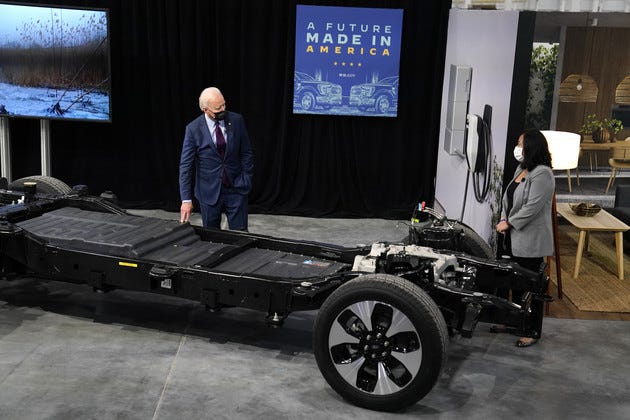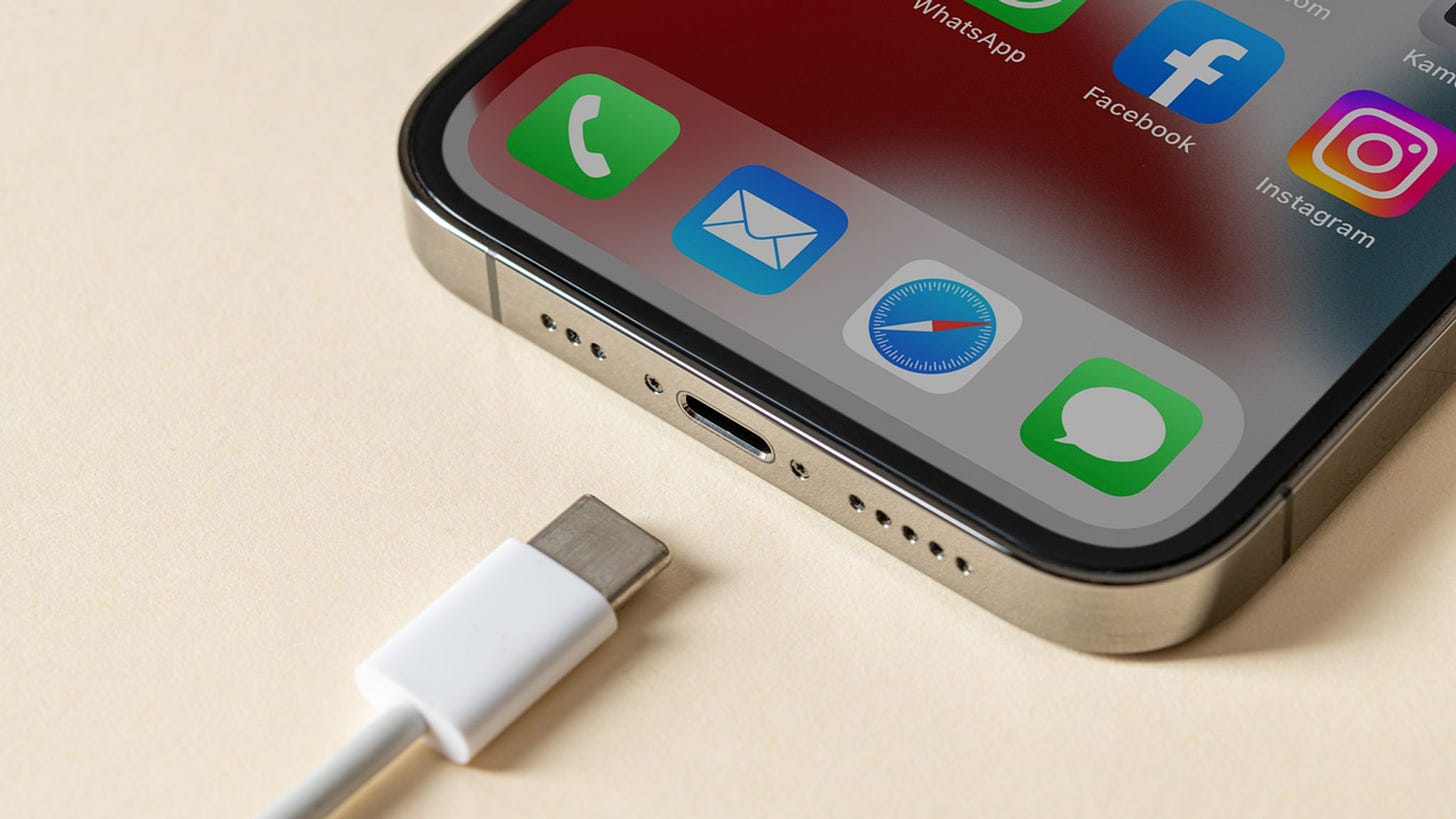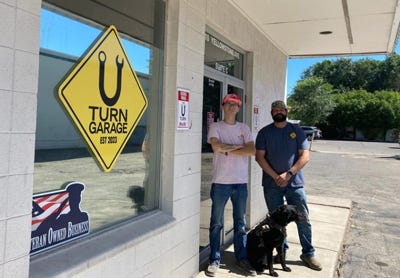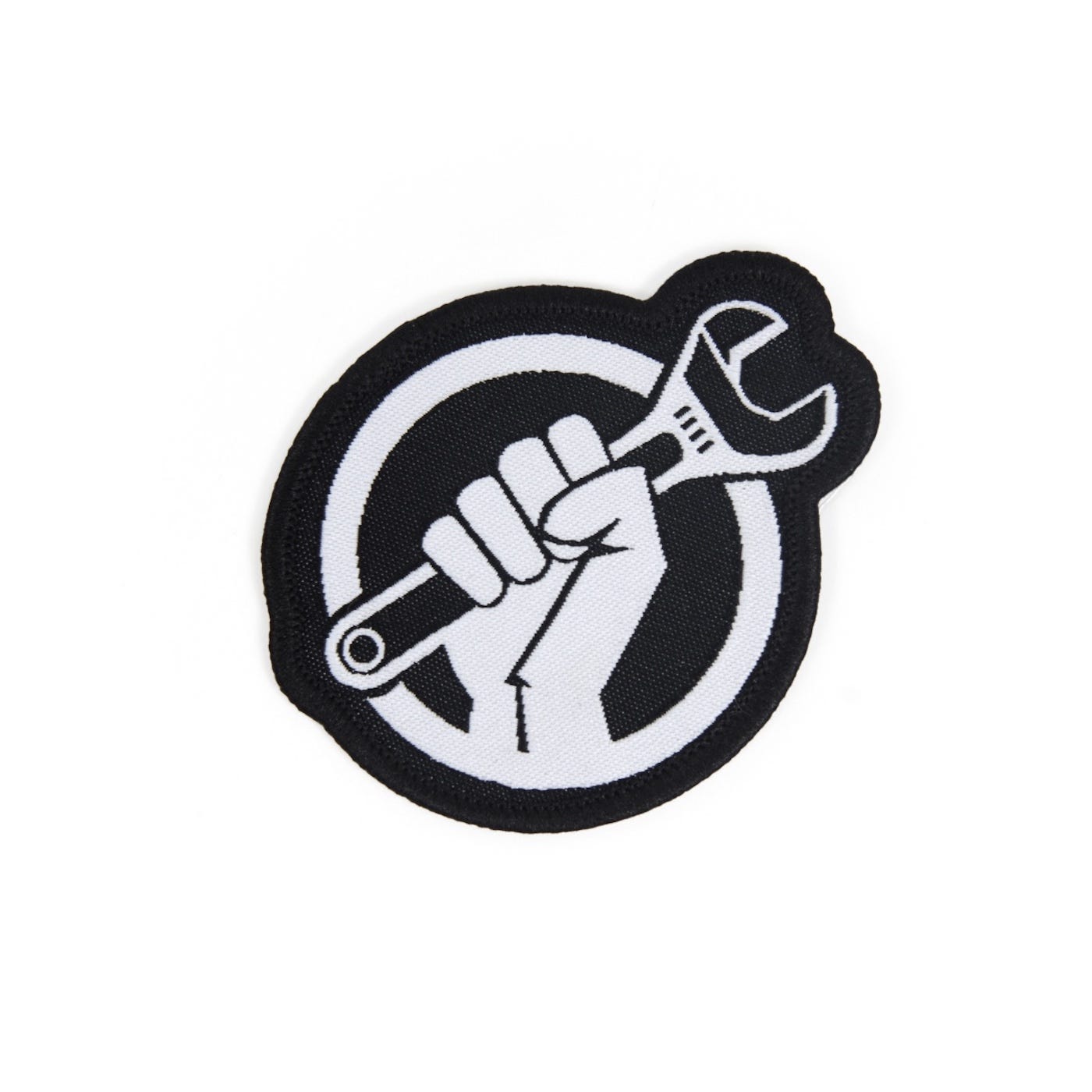Is Biden Li-Ion About Batteries? Also: How Apple Could Play the EU's USB C Requirement For Big Profits
The push to all electric vehicles is promoted as a way to help heal the climate. It's not that simple. Also: The EU forced Apple to standardize on USB C. But Apple may find a way to profit anyway.
In his speech two years ago to announce an executive order moving the U.S. to a 50% electric share for passenger cars and trucks, President Joe Biden evoked the term “clean car technology” to praise the environmental benefits of EV’s.
Whether it’s the sleek and futuristic look of Tesla’s Cybertruck or the allure of e-bikes and e-scooters, the “clean” and “green” economy of Biden’s dreams will likely be fueled by a very important piece of technology: the lithium ion (Li-Ion) battery. What is left out by Biden and many others championing the role of EV’s as a messianic technology that will put a stop to climate collapse is the environmental violence that is part of the production and disposal of these batteries. Repair and recycling of these batteries remains a secondary concern, but they cannot be ignored.

It’s not easy being green
Whatever a “green” or “sustainable” future might mean, there is no ignoring that battery consumption will exact a dramatic human and ecological toll.
Let’s start with the lithium. Lithium mining, which is driven by the growing demand for lithium-ion batteries used in electric devices and vehicles, has deeply harmful effects such as soil degradation, water shortages, and biodiversity loss, particularly in South American regions like the "Lithium Triangle" (Chile, Argentina, and Bolivia). Not to mention the human toll, such as child labor employed to ensure we get all our “green” gadgets.
The average lifespan of an e-scooter is 3-5 years, an e-bike is 10~ years, and an electric vehicle is around 10-20 years. When those machines come their end of life, their disposal creates problems. In North America, there is already an increase in the number of fires at waste and recycling facilities in 2022, totaling 390 incidents, causing injuries and fatalities. And while science continues to chip away at the technical side with prototypes such as Australian researchers at the Royal Melbourne Institute of Technology (RMIT) who developed a “proton battery,” claiming to offer a cleaner and safer alternative to toxic lithium-ion batteries, the problem remains rooted in much larger struggles with labor, consumption, and transportation.
Averting our eyes from the problems associated with the consumption of “green” tech won’t do us any good. What might help is more collective resources such as public transportation and zoning for things like 15 minute cities to lessen the need for our cars. The complicated question is how to get there?
What likely goes without saying is that more gas and internal combustion engines are certainly not the answer. But to assume that unfettered consumption can continue because the things we buy have a futuristic, earth-friendly veneer is wishful thinking.
Apple could still play the EU’s USB C requirement for profit
Apple has indicated that it will adopt USB-C ports in its iPhone 15 to comply with new European regulations that require USB C as a standard cable. But the included cables Apple will ship won't support fast charging, and the EU regulations omitted any cable specifications, according to reports.
That sets up a possible conundrum for iPhone owners, who will have to choose between a standard USB 2.0 cable with slow(er) data transfer speeds that comes with their iPhone 15 and a fast-charging, Apple-certified charger that would need to be purchased separately. Consumer adoption of the faster charger would allow Apple to continue its lucrative MFi (Made for iPhone/iPod/iPad) certification business which it currently enjoys with its Lightening connectors, allowing the company to extract tens (hundreds?) of millions of dollars in fees from manufacturers to receive the MFi certification.
Still, as this article notes, the existing Apple Lightening Cable used by iPhones was already recognized as older (and slower) technology than USB C with fewer physical contact points and an older design. So even a slower USB C might still be a lot faster than the existing Lightening connectors. So why stick with it? Because sales of cables - not to mention the licensing and fees third party manufacturers must pay to produce them and have them recognized by Apple iPhones - generates (likely) billions in revenue for the Cupertino company annually.
Fast or not, the shift to a standard cable interface is expected to have a huge (and positive) impact on consumers’ “bottom line.” The EU expects the common charger rule will drive greater re-use of chargers and save up to €250 million a year on unnecessary charger purchases in the EU alone. That will also reduce the amount of e-waste generated by electronics owners.
And this isn’t the end of the EU’s “asks” for Apple and other personal electronics makers. The company is also facing new and proposed European Union regulations covering issues like removable batteries and the right to repair.
Other News
Apple’s support for right-to-repair opens doors in other states - Right to repair supporters said that the decision by Apple to back a California right to repair bill is giving that effort momentum and potentially setting a precedent for other states, Zach Williams reports for Bloomberg Law. Apple’s support of California bill SB 244 that eases restrictions on repairing electronics - after years and millions of dollars lobbying against such laws - suggests a sea change, with manufacturers divided even as Apple, Microsoft and others seek to limit the impact on their businesses.
How long should appliances last, anyway? Consumer NZ has published a report with estimated lifespans for various household appliances sold in the country. The report offers insights into how long Kiwis can expect their home appliances to last - and the answers may surprise them, with lifespans influenced by factors like initial quality, maintenance, and use. According to the report, dishwashers enjoyed useful lives of approximately 10 years, but regular cleaning and maintenance can extend their life. Fridges and freezers lived somewhat longer: around 11 years, with consideration for repairs before replacing. Ovens and stoves were expected to last about 15 years with lifespans limited by the availability of spare parts, while microwaves last about 8 years, with costly repairs.
About that California right to repair bill… In the meantime, SB 244 still hasn’t come up for a vote by the California legislature, as this report over at wastedive.com notes. California's legislative session will end on Sept. 14, with a number of bills related to waste , recycling and repair still under consideration - SB 244 among them. Also in play: a bottle bill expansion and recycling center payment adjustment.
Fairphone playing hard to get with US smartphone buyers. The Fairphone 5 is launching in Europe and the U.K. with no plans for a North American release, according to a report over at Androidcentral. That may be due to the unique requirements of cell phone networks in the U.S. and Canada, which differ from the rest of the world and would require Fairphone to produce a different model just for use in North America. The Fairphone is widely recognized for its pro-repair design and other sustainable practices, contrasting with more profit-oriented tech giants like Samsung and Apple. Among other things, the company offers a 5 year device warranty, easy part replacement and software support for eight years (2031) ensuring long term usability.
U Turn Garage is a DIY automobile repair shop in Pocatello, Idaho, where customers can book appointments to use the facility's tools, car lift, and even access instructional YouTube videos, offering an affordable and convenient alternative to traditional mechanics.
The Nokia G42 5G is launching in in India, promoted as India's first user-repairable 5G phone, with specifications including a 6.56-inch IPS LCD HD+ display, Qualcomm Snapdragon 480+ chipset, 4GB/6GB RAM, 128GB storage, a 50MP primary camera, 5,000mAh battery, and support for 20W fast charging, along with multiple connectivity options.
Trek Bicycle has introduced "Red Barn Refresh," the cycling industry's first manufacturer-led bike trade-in and refurbishment program, allowing customers to return used Trek bicycles for in-store credit to buy new ones, while the used bikes are refurbished and sold on the brand's website, emphasizing sustainability and reducing waste in line with the company's commitment to a more sustainable future as outlined in its 2023 Sustainability Report.
Antitrust is getting a boost from the decline of the consumer welfare ideology, the emergence of grassroots support for anti-monopoly efforts, and the renewed focus on the language and legislative history of the antitrust statutes says Stacy Mitchell with the Institute for Local Self Reliance. These changes are seen as a move toward a more democratic and transparent approach to antitrust enforcement, aiming to address economic inequality and corporate concentration.
Bridget Harvey, a maker and researcher, discusses her interest in repair, her preference for the term "repair," her exploration of repairing ceramics, and the visibility of repairs in her work, emphasizing the importance of caring for objects and the changing attitudes toward mending and repair, with hope for more legislation and education around repair in the future.
The Beyond Growth Conference held at the EU Parliament in Brussels gets unpacked on the new Substack newsletter Convivial Means. With presentations from prominent scholars and youth activists, writer and researcher Nishikant Sheorey emphasizes the need to address both capitalism and colonialism in the face of our environmental crises. This (long) piece uses the conference as a jumping off point, and takes a radical analysis of degrowth, discussing alternative forms of social organization, such as anarchism.
Zero Waste Europe is calling for fashion to align with sector with planetary boundaries, proposing measures such as banning the destruction of unsold goods, setting waste reduction targets, and providing financial incentives for producers to transition towards a more sustainable fashion industry. The organization emphasizes the need for regulatory frameworks that address the root causes of waste and promote a culture of sufficiency to reduce over-consumption of fashion items.
A moratorium on deep-sea mining to protect the marine environment has been enacted by the the International Seabed Authority (ISA), emphasizing the need for sufficient scientific evidence before allowing such activities, as deep-sea mining could exacerbate the ocean's existing stressors. The industry has been questioned as unnecessary, with alternative measures like recycling and circular economy practices suggested to reduce mineral demand, and Canada is urged to set global environmental standards to protect its Arctic and coastal regions concerning deep-sea mining as well.
Historic preservation, climate change, and sustainability all intersect in construction and demolition waste, which constitutes a significant portion of the waste stream in the U.S. Advocates for reusing existing buildings want to use these materials as a more eco-friendly option than traditional practices.
Apple's support for a California right-to-repair bill is bolstering efforts to advance similar legislation in multiple states, despite some manufacturers' concerns, marking a notable shift in the landscape of the right-to-repair movement.
Pennsylvania has become the 30th state to introduce Right to Repair legislation in 2023, joining the growing momentum of states considering laws that require manufacturers to provide access to parts, tools, and information needed for electronics repair





